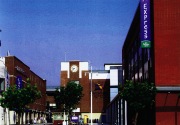Fan-coil units specially designed for hotel requirements

One of the first hotels to be fitted with Ability’s Aurora II fan-coil units specifically designed for hotel requirements is the Holiday Inn Express, Portsmouth.
Following a study of the requirements of hotels, Ability Projects has developed an upgraded version of its hotel fan-coil system. Aurora II is based on a chassis-type fan-coil unit and acknowledges that hotel bedrooms require short cooling and heating cycles, so that the full operational capabilities of 4-pipe fan-coil systems are largely redundant. The new system is based on a control-integrated 2-pipe changeover fan-coil unit with electric heating and supplied with chilled or LPHW via a heat-pump chiller on a seasonal basis. A temperature sensor on the flow side of the FCU activates heating or cooling as required. A Siemens LCD room temperature controller monitors and adjusts room temperatures during cooling and heating cycles, initiates automatic changeover and switches the electric heater and 3-speed fan throughout normal, energy-saving and standby operating modes. The FCU is 755 mm long, 516 mm wide and 235 mm deep, so that it can fit into restricted spaces in bulkheads above room doors. Cooling capacity is 1.5 kW, with noise levels of NR30 by day and NR25 overnight. Special features for hotel application include a control enclosure with access from below and rear-facing pipe connections. Standard options include quick-connection waterside flexible hoses, integrated commissioning packages and DC fan/motor combinations. The remote control system can be interfaced with a time clock, hotel-booking system or room keycard system. sales@ability projects.co.uk


